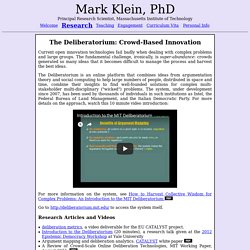

Supporting Collaborative Deliberation Using a Large-Scale Argumentation System: The Mit Collaboratorium by Mark Klein, Luca Iandoli. Mark Klein Massachusetts Institute of Technology (MIT) - Sloan School of Management Luca Iandoli affiliation not provided to SSRNFebruary 20, 2008 MIT Sloan Research Paper No. 4691-08 Abstract: Current open-source/peer-production technologies, such as forums, wikis and blogs, have enabled an unprecedented explosion of global knowledge sharing, but appear to be less successful at enabling collaborative deliberation (i.e. the systematic enumeration, analysis, and selection of solution alternatives) around the complex systemic challenges, such as climate change, now facing humankind.

Number of Pages in PDF File: 10 Keywords: MIT Collaboratorium, collaborative deliberation, peer-production working papers series. The Deliberatorium. Mark Klein, PhDPrincipal Research Scientist, Massachusetts Institute of Technology The Deliberatorium: Crowd-Based Innovation Current open innovation technologies fail badly when dealing with complex problems and large groups.

The fundamental challenge, ironically, is super-abundance: crowds generated so many ideas that it becomes difficult to manage the process and harvest the best ideas. The Deliberatorium is an online platform that combines ideas from argumentation theory and social computing to help large numbers of people, distributed in space and time, combine their insights to find well-founded solutions for complex multi-stakeholder multi-disciplinary ("wicked") problems. The system, under development since 2007, has been used by thousands of individuals in such institutions as Intel, the Federal Bureau of Land Management, and the Italian Democratic Party. Go to to access the system itself. Research Articles and Videos Popular Press Articles Collaborators.
Climate and the Web: 'Electronic Democracy on Steroids' Can We Exploit Collective Intelligence for Collaborative Deliberation? The Case of the Climate Change Collaboratorium by Luca Iandoli, Mark Klein, Giuseppe Zollo. Luca Iandoli affiliation not provided to SSRN Mark Klein Massachusetts Institute of Technology (MIT) - Sloan School of Management Giuseppe Zollo University of Naples Federico II12/2007 MIT Sloan Research Paper No. 4675-08 Abstract: Current open-source/peer-production technologies, such as forums, wikis and blogs, have enabled an unprecedented explosion of global knowledge sharing, but appear to be less successful at enabling collaborative deliberation (i.e. the systematic enumeration, analysis, and selection of solution alternatives) around the complex and controversial challenges, such as climate change, now facing humankind.

Number of Pages in PDF File: 23 Keywords: collective intelligence, collaborative deliberation, peer-production technology working papers series. Bringing order to online discussions about climate change : Boston Blog. MIT researchers are developing a new online forum that they say will help make discussions about climate change more productive.

Mason Inman Public discussion about climate change has always been heated, but online, those debates are notorious for being biased, poorly articulated, or simply ignorant. Researchers at MIT are creating an online forum that they say will help foster more organized debate and critical thinking. Their vision is of a website open to the public, where people can post about the latest scientific results on climate change and debate how to cut carbon emissions, and where politicians can get a sense of public opinion. The website, which the researchers call the Climate Collaboratorium, would be something like the Wikipedia version of the authoritative reports from the Intergovernmental Panel on Climate Change (IPCC). Map that argument Klein points to Wikipedia as an example of the reach—and also the pitfalls—of online collaboration. Putting it to the test.